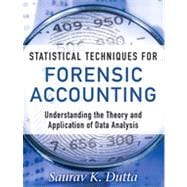
What is included with this book?
1. Introduction to Forensic Accounting and Fraud Detection
2. Fraudulent Financial Reporting
3. The Fraud Triangle and Other Red Flags
4. Prevention of Fraud, Corporate Governance and Internal Controls
5. Detection of Fraud, Shared Responsibility
6. Data Mining
7. Qualitative Characteristic of Evidence
8. Data Types and Probability
9. Continuous Probability Distribution and their Properties
10. Statistical Inference
11. Sampling and Sample Size Determination
12. Statistical Estimation
13. Auditor Decision and Risk of Error
14. Fundamentals of Hypotheses Testing
15. Regression and Correlation
16. Time Series Analysis ( To be decided upon further consultation)
17. Classification and PredictionThe New copy of this book will include any supplemental materials advertised. Please check the title of the book to determine if it should include any access cards, study guides, lab manuals, CDs, etc.
The Used, Rental and eBook copies of this book are not guaranteed to include any supplemental materials. Typically, only the book itself is included. This is true even if the title states it includes any access cards, study guides, lab manuals, CDs, etc.